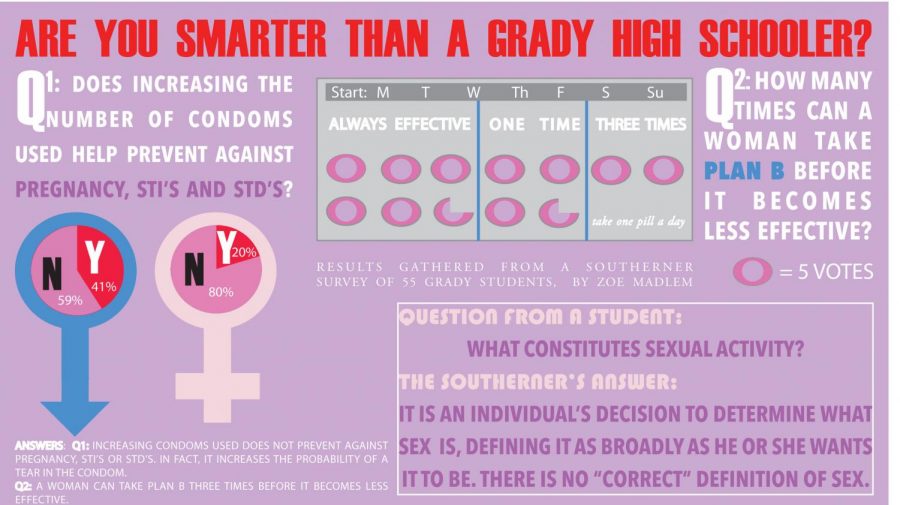
Olivia is a senior at Grady and excited to be the Co-Editor in Chief of The Southerner! This is her second year as a staff member on The Southerner, and...


Sexual education program reforms Georgia's abstinence-only health curriculum
November 6, 2017
The birds and the bees. Sound familiar?
How about these: consent; teen pregnancy; sexually transmitted disease?
How much do high schoolers really know about sex? And how much of that knowledge is the responsibility of the school’s health education?
In a Southerner survey of 160 students, 40 percent of Grady students said they are sexually active, yet 67 percent indicated they do not know how to use a condom. And on a scale of 1-to-5 (with 5 representing the highest level of preparedness), the average value for sexual activity preparedness after taking the school’s health class was barely over 3, according to the results.
While 85 percent of surveyed students indicated they believe comprehensive sexual education does not encourage students to be sexually active at a young age, Georgia continues to preach and teach an abstinence-based curriculum throughout its state-mandated sex-ed programs.
“People are going to do it anyway, so students might as well know how to do it safely,” junior Lily Muscarella said.
“State law requires all Georgia school districts to teach and adhere to a sex-education program that includes abstinence as ‘the only sure method of preventing pregnancy and sexually transmitted diseases’ and as a method of preventing HIV,” concluded a survey which measured how schools across the Greater Atlanta area are teaching sex ed.
Conducted in 2016 by the Georgia Department of Education and creative strategy specialist Charles W. Jones, the study found only one county, DeKalb, to provide a comprehensive sexual education curriculum.
According to Myss Jelks, former Grady health teacher and currently the athletic director at KIPP Atlanta Collegiate High School, teachers were instructed to teach the ‘bare minimum’ when it came to the sex ed unit.
“We kept it very basic,” said Jelks, also Grady’s former athletic director. “Because we are in the wonderful Bible Belt of the south, teachers know [abstinence only] is the standard for Georgia, so that’s how we have taught the students. We didn’t always come in class and say ‘this is an abstinence-only focus,’ but we did emphasize abstinence, more often-than-not.”
IN GEORGIA WE TRUST
Sexual education programs are controlled on a state level. While, by definition, sex ed is health-and-scientifically-based, it is often influenced by political aspirations and ideologies of the state that regulates it. Georgia, along with 36 other states, teaches an abstinence-only curriculum, regardless of the 2007 federal survey conducted that found abstinence-only programs have “no impact on rates of sexual abstinence.”
“In my opinion, I feel like Georgia is abstinence-only [because it’s] in the South,” said Tamara Aldridge, physical education teacher. “It seems somewhat more traditional with values that probably used to be more popular with generations of the past and who are perhaps now the policy makers. I feel like youth are more open minded and fact seeking than adults give them credit for.”
Some students who took health at Grady prior to the 2016-2017 school year believe teachers were limited in what they could say regarding sexual behavior, mindful of Georgia’s abstinence-based emphasis. Senior Magda Dumitrescu, who took health with Aldridge in 2015 and identifies as lesbian, called herself the class’s LGBTQ representative and reports having to explain information not typically discussed from an abstinence-only focus point.
“I feel like my teacher [Aldridge] wanted to explain more about gender identity and sexuality, but she was limited on what she could say to avoid a conflicting class and because Georgia has very strict regulations on what you can and cannot say about that kind of stuff,” Dumitrescu said.
Dumitrescu said her teacher was careful not to mention anything in too much detail that would conflict with the curriculum.
“Instead of her saying it, she asked me to explain it so the class would still get the information,” Dumitrescu said. “I got all these kinds of questions. I totally understand why my teacher asked me to explain all of that, but it was a very awkward part of the unit. Because every time something would be brought up about gender or sexuality, the whole class would turn to me.”
FLASH PASS TO PROACTIVENESS
In September 2015, the State Board of Education unanimously voted to approve Atlanta Public Schools (APS) as a charter system, making the school district the 33rd in Georgia to achieve charter status. Under a five-year contract with the State Board of Education, APS officially converted into a charter system beginning with the 2016-2017 school year. As a charter system, more people are involved in decision making, APS has said.
Along with the change to charter status, APS assumed more responsibility for determining its sex-ed curriculum.
“I know there was a committee at the district level made of teachers, parents, doctors and other stakeholders in determining what program should be adopted by APS,” Aldridge said. “Up until we adopted Family Life and Sexual Health (FLASH), [sexual education] was abstinence-only.”
APS adopted FLASH second semester last school year for its K-12 health standards. The district received funding from the Georgia Campaign for Adolescent Power and Potential. According to the organization’s website, FLASH is based on the theory that beliefs are linked to behavior. FLASH was developed by the health department in Seattle, Wa. as a means to prevent teen pregnancy, STDs and sexual violence by encouraging young people to make healthy choices.
“FLASH was piloted in 12 schools in the 2016-2017 school year,” said Daryl Rice, the health and physical education coordinator for APS. “Piloting FLASH provided an opportunity for students, teachers, parents and principals to give feedback on the program.”
Rice said the revised sex-ed unit utilizing FLASH as the curricular resource is comprehensive, medically accurate, values neutral, age-appropriate and highly encourages family involvement. Grady students enrolled in health classes after the implementation of the FLASH curriculum consider the sex education unit to be thorough.
“I would say [the sexual education unit in health] was pretty comprehensive,” said Sebastian Gerz, a sophomore who took health after the implementation of FLASH. “We spent a long time on [sexual education]. It was probably half the semester. My teacher covered everything I would have been comfortable covering: what was in the textbook and more.”
FLASH trains teachers in the “foundations of sexual health and HIV instruction,” “how to answer sensitive student questions” and the “best practices for teaching key sexuality education topics, such as abstinence, puberty, sexual violence prevention, LGBTQ issues and more,” according to its training documents for teachers.
Health teachers welcome the support to fully utilize the program. Aldridge said Grady ’s teachers received a full day’s training, including a FLASH support person to assist with technology and delivering lessons teachers found uncomfortable. FLASH provided another day of training during the teacher planning period in July before school started this fall, according to Aldridge.
FLASH has improved the curriculum, teachers say.
“I definitely appreciate the changes [FLASH brought],” Jelks said. “My doctoral research was on sexual education in Georgia high schools. It was really good to see that we were progressing, because at the end of the day, kids are more privy to things they see on the internet and on TV, and before [FLASH], we didn’t see that talked about in health. Kids get the information so much earlier, and FLASH discusses things that we really needed to teach at [high school] ages.”
LET’S TALK ABOUT SEX, BABY
Discussions about sexual education at Grady will continue, with the ultimate goal resulting in a comprehensive, medically-accurate and appropriate education.
“Sexual health education instruction should be age-appropriate and should anticipate students’ growth and development,” Rice said. “The American Academy of Pediatrics reports ‘There is no evidence that increased sexual knowledge affects the likelihood of adolescents having sexual intercourse at a younger age.”


Olivia is a senior at Grady and excited to be the Co-Editor in Chief of The Southerner! This is her second year as a staff member on The Southerner, and...